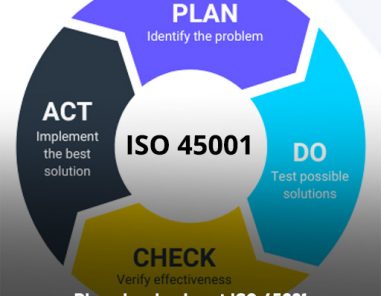
Plan-do-check-act ISO 45001
The “Plan, Do, Check, Act” (PDCA) cycle is widely recognised as a staple of I...
Read MoreThe validity of your ISO certification lasts for three years. However, if you are not able to maintain compliance during these three years, your ISO certification can get suspended. In this article, we will talk about the duration of your ISO certification, the certification process, how to maintain its validity and its various benefits.
If you don’t have enough time to read this article, just use our ISO consulting service to get complete information about your ISO certification status.
International Organization for Standardization (ISO) certificate is an emblem of authenticity, granted by a third-party certification body, to organisations that adhere to the recommendations of a chosen ISO standard. ISO standards are the amalgamation of industry-specific best practices that help organisations create flexible management systems to improve business efficiency and cost savings. Some of the popular standards against which you can acquire certification include:
If you are a business owner in Australia and want to get ISO certification, we will help you find out how to get ISO certification in Australia.

As you may have guessed from reading about the different types of standards, the benefits of the certification depend upon the type of management system that you have implemented in your organisation. For example, if you implement a QMS based on ISO 9001, you will enjoy benefits such as improved efficiency, the better quality of your products and enhanced customer satisfaction. Similarly, if you implement an EMS in your organisation, you will enjoy benefits such as better environmental performance, better brand credibility and the loyalty of environmentally conscious consumers.
The ISO certification process is simple if you focus time on planning and documentation. Essentially, you begin by understanding the requirements of the standard that you are thinking of implementing in your organisation. Then, in order to achieve compliance, you conduct a gap analysis to identify the gaps that are between your current practice and the recommendations of the chosen standard, going on to document the process. If no non-conformances are found, you are ready for an external body certification audit.
For example, we have already fully explained how to get ISO 9001, which can help you understand the conditions for obtaining ISO certification.

As mentioned above, your ISO certification remains valid for a period of three years. There are no exceptions to this rule, however, during the pandemic, certain organisations were granted a leeway of extension.
In order to maintain the validity of your certificate, your organisation needs to conduct periodic surveillance audits. A surveillance audit can be described as a regular assessment of your management system and its processes, where its functionality and compliance are measured. Simply put, a surveillance audit checks if you are still compliant with the recommendations of the standard by measuring if your processes are working how they have been described in the documentation.
Moreover, you need to maintain documentation as it serves as evidence of your compliance maintenance efforts. If you successfully clear your surveillance audits, you will be able to maintain the validity of your certificate. An unsuccessful performance can lead to the suspension of your certificate.

As a business owner or a member of the management team, understanding and interpreting the ISO standard in your organisation can be a time consuming job. Bringing in an ISO consultant helps to save time, effort and resources. At the ISO Council, we offer customised services, so that your certification process becomes hassle-free, fast and enjoyable. The three pillars of our company are :
An ISO certificate is a badge of honour that verifies the quality of your processes, products and services. Irrespective of the ISO standard that you implement in your organisation, you can reap benefits such as enhanced brand credibility, better business opportunities, higher revenues and enhanced customer satisfaction. To maintain the validity of your certification, you need to conduct regular surveillance audits and maintain documentation of your compliance efforts. An ISO consultant makes your certification process faster by utilising their experience to integrate the standard into your operations.
ISO certification gives your organisation a competitive edge. By helping you increase operational efficiency and overall product consistency, your business credibility and authority will soar to new heights.

Copyright © 2025 The ISO Council | Privacy Policy